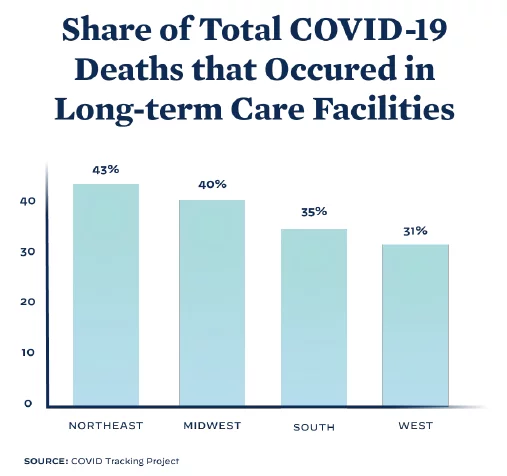One day after President Joe Biden took office, his administration released its national strategy for combating Covid-19. The 200-page plan calls for a “laser-focus” on vaccinating people at highest risk, including older adults and people in congregate settings, as well as “targeted surge assistance” to help contain Covid-19 outbreaks in assisted living.
“The United States will accelerate the pace of vaccinations by encouraging states and localities to move through the priority groups more quickly — expanding access to frontline essential workers and individuals over the age of 65, while staying laser-focused on working to ensure that the highest-risk members of the public, including those in congregate facilities, can access the vaccine where and when they need it,” the strategy document states.
Starting in late December, senior living communities began to hold Covid-19 clinics, most of which have been run through the Pharmacy Partnership for Long-Term Care. Under this program, senior living providers are working with pharmacy giants CVS and Walgreens to vaccinate residents and staff.
“The Administration will also build on the CDC Pharmacy Partnership for Long-Term Care (LTC) Program to ensure that long-term care residents and staff can receive vaccinations in as streamlined and effective manner as possible,” according to the plan released Thursday.
Vaccination progress has been made in the last month; for example, 90% of Brookdale Senior Living (NYSE: BKD) communities have held or scheduled their first vaccine clinic, and more than half of Capital Senior Living (NYSE: CSU) communities have completed first-dose clinics. However, vaccines have been slower to reach some assisted living communities. For instance, Wisconsin prioritized skilled nursing facilities and only began to vaccinate assisted living residents more recently.
Though details are scarce, the American Seniors Housing Association (ASHA) is supportive of moves to expand the LTC Pharmacy Program and accelerate distribution of vaccines to residential care settings, ASHA President David Schless said in comments emailed to SHN.
However, he also has some concerns about aspects of the national strategy.
“We are concerned that by calling on states to expand eligibility to other workers and younger age groups, much like the previous administration did recently, before addressing all of senior living residents and staff, it will stress the system and threaten the scarce vaccine supply,” he noted. “This becomes more problematic when certain settings such as independent living are being left out of the LTC pharmacy plan.”

ASHA also is concerned about plans for releasing more vaccine supply while maintaining committed to the current, two-dose regimen. This approach is “dependent on moving parts working in concert,” with the risk being that second-dose supply will not be available when needed.
But ASHA is encouraged by the comprehensive plan to accelerate vaccine supply and distribution and has a “simple message” to the administration:
“Include all senior living in the existing LTC Pharmacy Program, including independent living. It is the most efficient and safest way to disseminate vaccine to this vulnerable population and the staff and prevent hospitalizations and demand on the greater health care system.”
Providers also have been ramping up their Covid-19 testing initiatives as the virus has surged over the winter months. The Biden plan calls for testing protocols for congregate settings.
“We hope this means the cavalry is coming, especially on testing and vaccine initiatives,” Katie Smith Sloan, president and CEO of senior housing and care association LeadingAge, said in a statement issued Thursday. “We urge the Administration to do more to address the needs of those who have been most impacted by the virus: older Americans and those who care for them.”
To start enacting this plan, Biden has signed several executive orders, including one that calls on government institutions such as the Department of Defense (DOD) and the Department of Health and Human Services (HHS) to provide “targeted surge assistance” as needed to assisted living communities and other types of health care providers.
The executive order does not describe what form this surge assistance might take. At various points in the pandemic, the National Guard has been called on to help contain outbreaks.
The national strategy document repeatedly emphasizes that older adults — particularly those in congregate settings — are among those at highest risk for Covid-19 infection, hospitalization and death, and cites statistics to demonstrate the point. Going forward, the Biden administration intends to collect more data related to congregate settings, support staffing levels, and tighten infection control policies.
“HHS and the Center [sic] for Medicare and Medicaid Services will strengthen Long Term Care facility guidance, funding, and requirements around infection control policies; support Long Term Care staffing levels sufficient to ensure patient safety, and support the accelerated distribution of vaccines to residential care settings,” the strategy document states.
While federal oversight of assisted living is currently limited, there have been indications that the Biden administration and a Democratic majority in Congress could seek to tighten regulations. Already, a group of lawmakers including Democratic Sen. Elizabeth Warren of Massachusetts introduced a bill to increase the Covid-19 data that assisted living providers would have to furnish, citing their concerns over a lack of publicly available information during the pandemic.
The No. 1 advocacy priority of industry association Argentum is “taking proactive steps to prevent onerous and misguided legislative and regulatory oversight.”
Overall, Biden’s strategic plan offers a sweeping approach to controlling Covid-19, with a focus on the reaching communities that have been disproportionately affected, advancing equity across racial, ethnic and rural/urban lines. He also pledged transparency and honesty, and warned of hard days ahead.
“The honest truth is we are still in a dark winter of this pandemic,” Biden wrote in an introductory letter to his strategic plan. “It will get worse before it gets better.”

